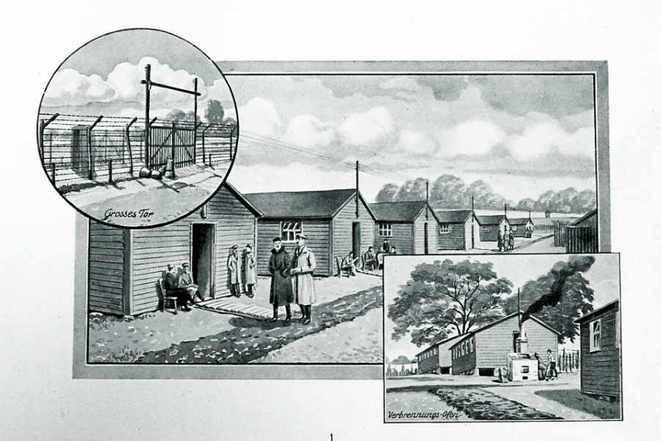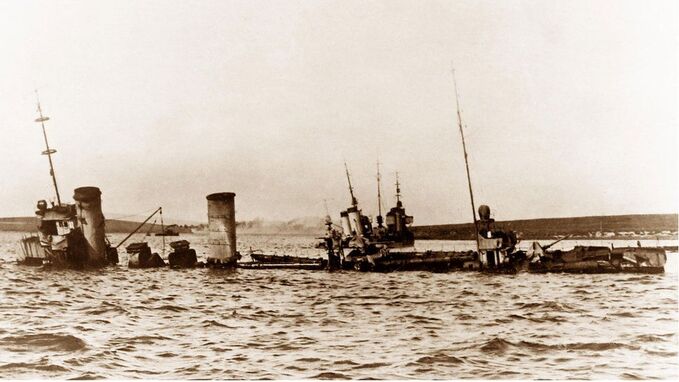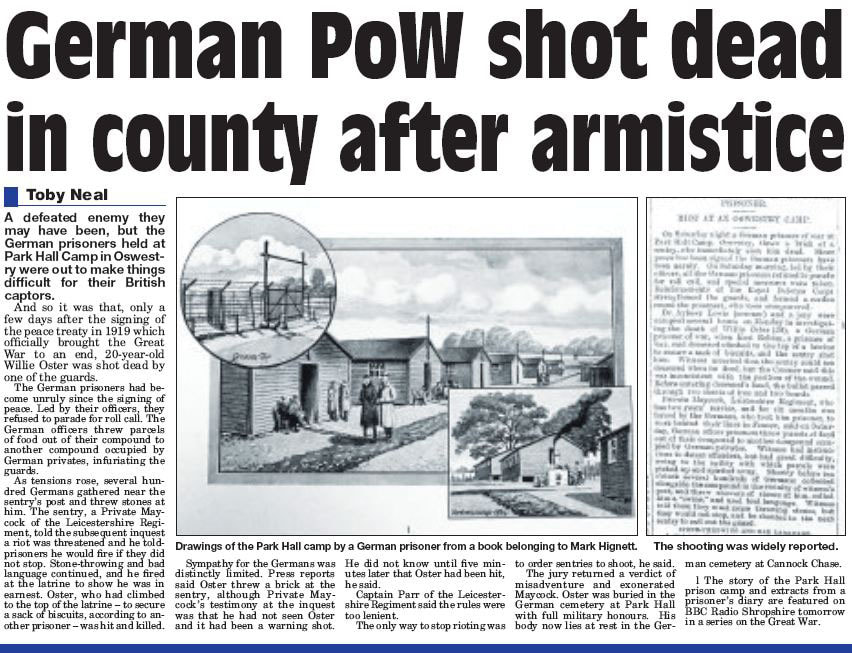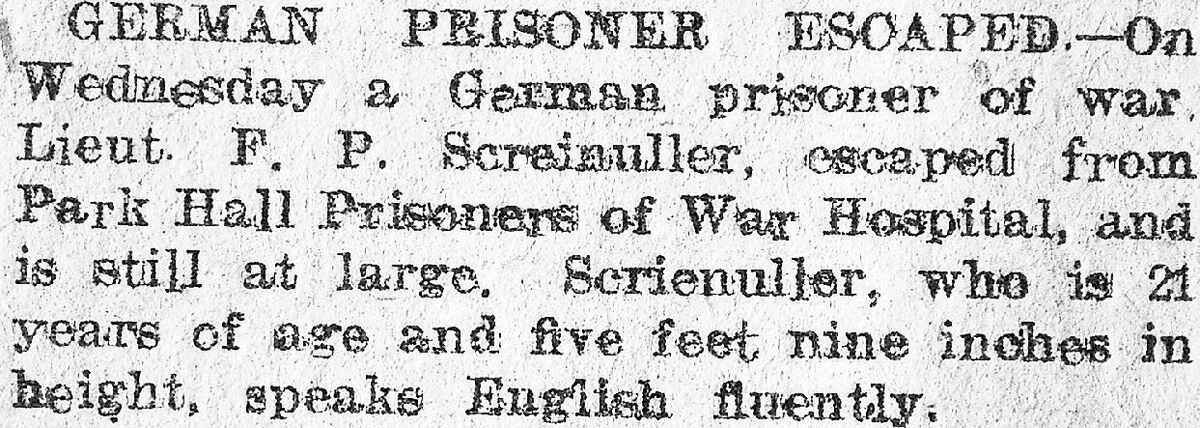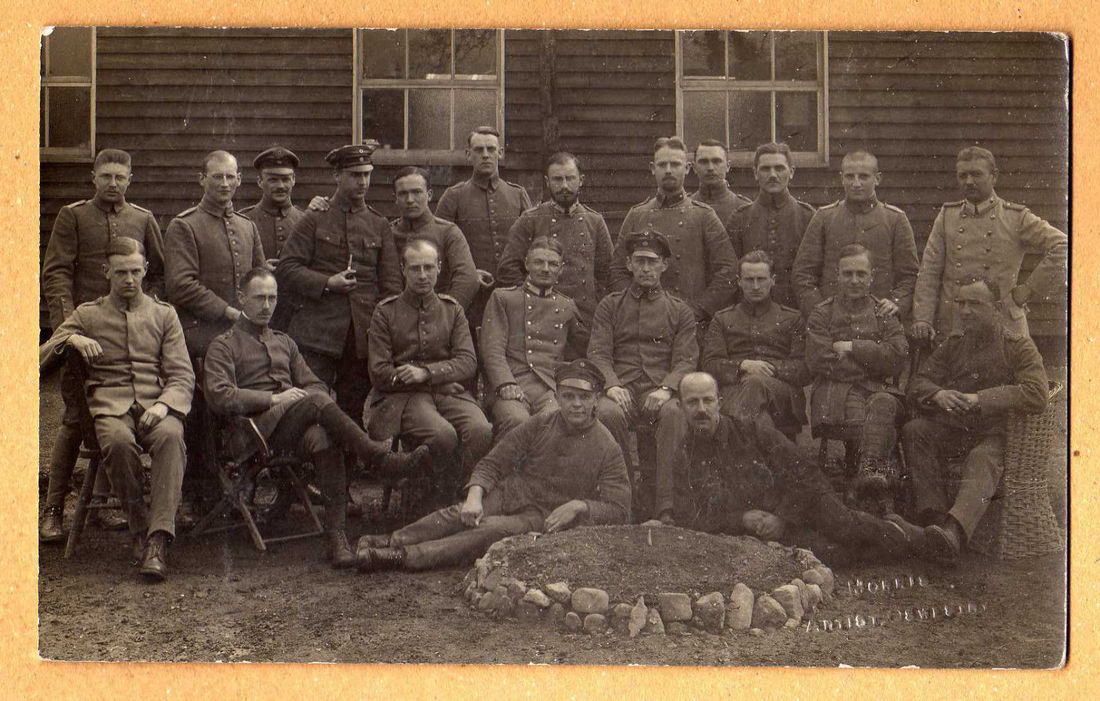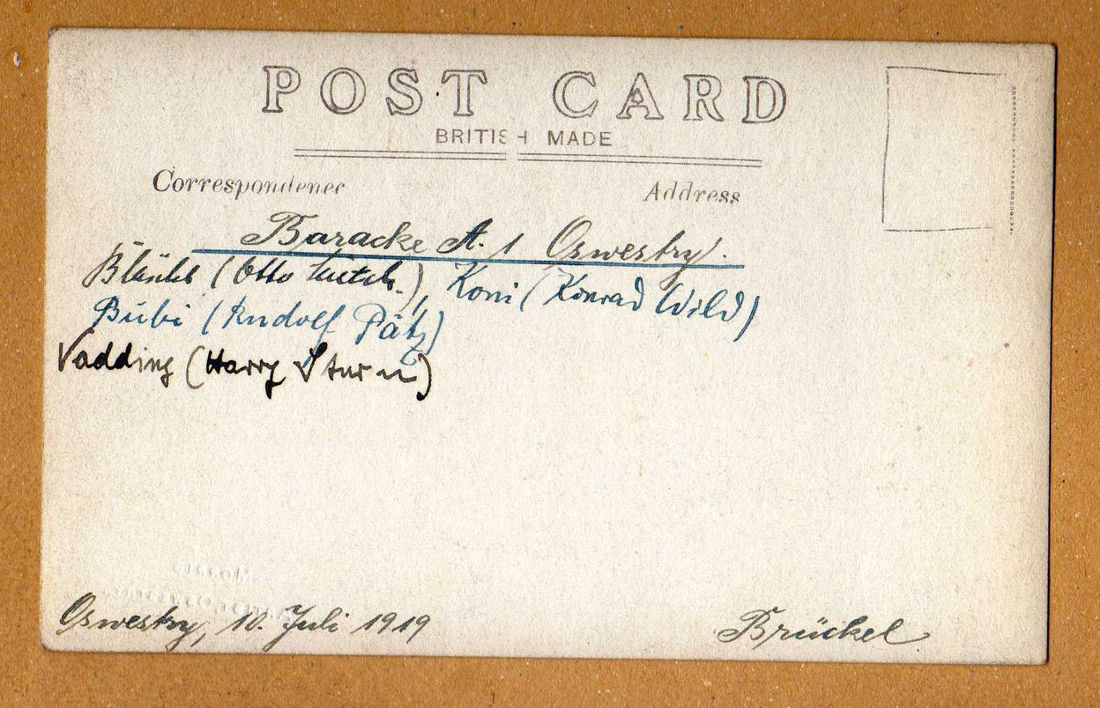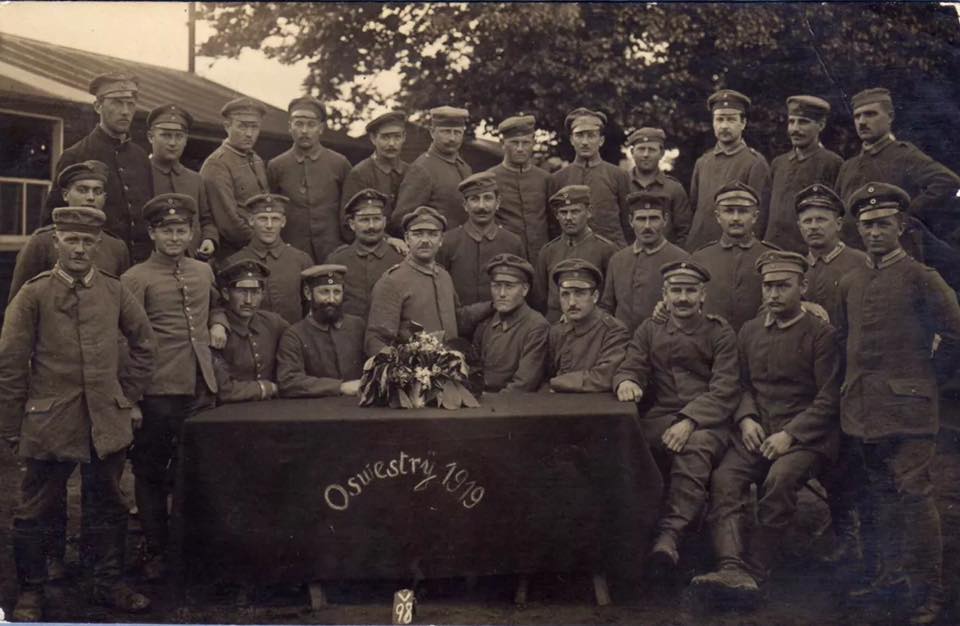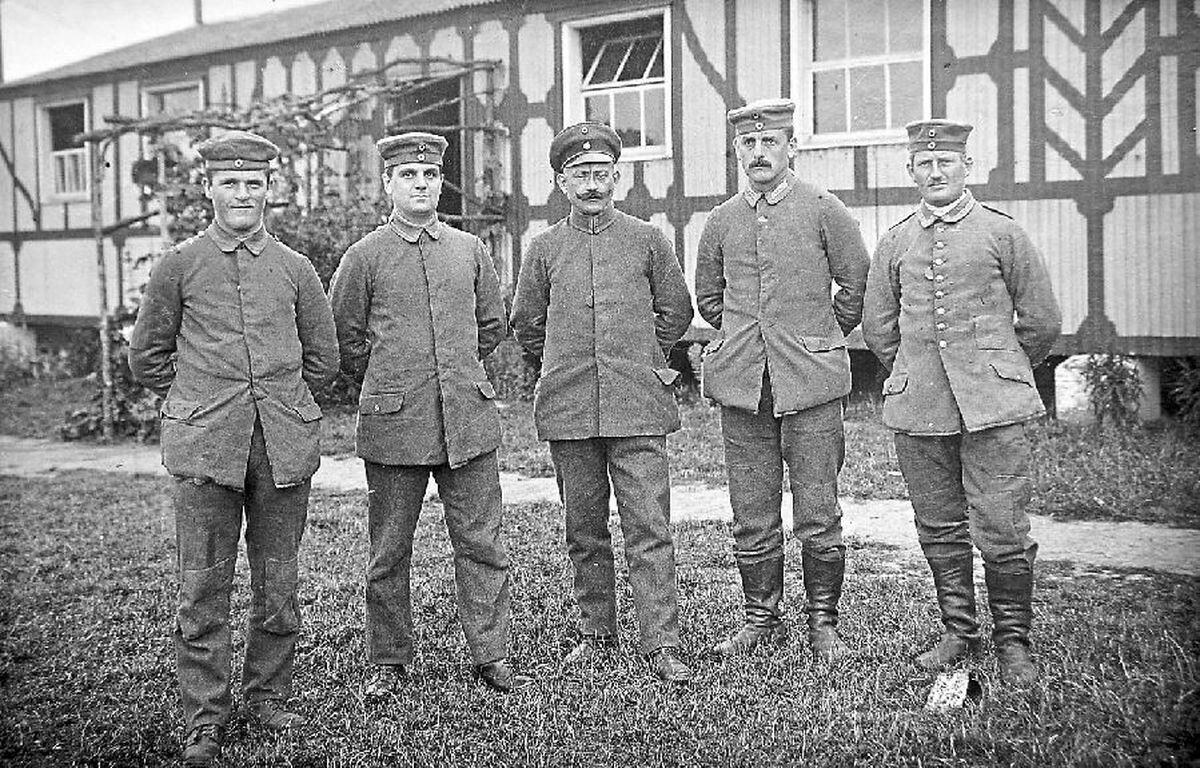German Prisoner of War Camp
Mile House, Oswestry
Mile House, Oswestry
The rank and file prisoners were used as work parties on the local farms or plantations but the officers tended to keep to their camp, usually making their own entertainment. They set up a choir and put on recitals, organised art exhibitions, played football, handball, hockey and tennis and organised a festival of sport. They were also allowed to drink beer and wine and read English newspapers. The photo below shows German prisoners of war dressed for a performance at Park Hall camp 1919.
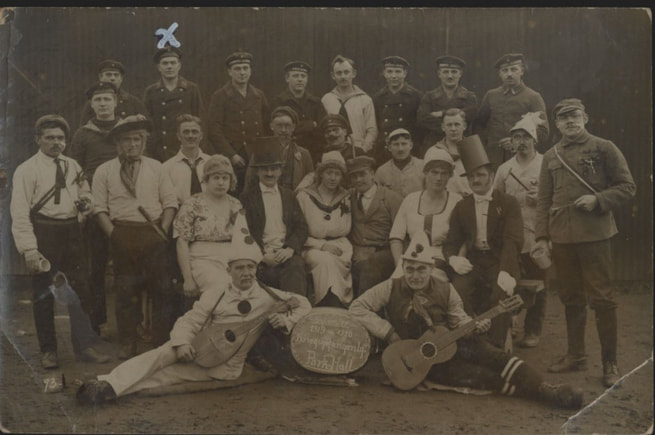
One of the German prisoners, Friedrich Thomas, recorded in his diary that "It had not been so bad but there were privations in winter such as wading through the ankle deep mud to the privy at night, frozen water in the wash house and the lack of acceptable cocoa".
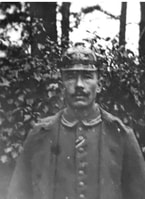
The picture (left) is of Wilhelm Eid a German soldier who was captured in August 1914 and sent to Park Hall Prisoner of War Camp. Here he stayed until October 1919. Over a century later, when the eldest of his four daughters died at the age of 94, her son Joachim Rettig discovered Wilhelm’s war diary among her possessions. A copy of his diary can be seen by clicking on the PDF file below.
| park-hall-diary_english_translation.pdf | |
| File Size: | 774 kb |
| File Type: | |
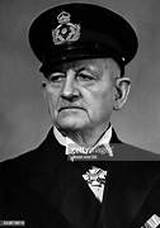
Hans Hermann Ludwig von Reuter was a German admiral who commanded the German High Seas Fleet when it was interned at Scapa Flow in the north of Scotland at the end of World War I. On 21 June 1919 he ordered the scuttling of the German fleet in Scapa Flow to prevent the UK from seizing the ships. Following the Armistice, just as the German delegation were about to sign the Treaty of Versailles, he decided to make a drastic decision to prevent the Allies from taking control of the Fleet. This plan had been kept a secret from the Allies as a contingency to protect the grace and dignity of the Imperial German Navy.
Within five hours, 10 battleships, five battle cruisers, four light cruisers and 32 torpedo boats all sank at Scapa Flow; there were four light cruisers, 14 torpedo boats and one battleship which they attempted to scuttle but were beached by the British when they found out, towing them to shallow waters. There were four destroyers which remained afloat. There were nine deaths onboard; one was the captain of one of the ships.
Von Reuter and the 1,173 officers and crew of the fleet were arrested and made prisoners of war for disobeying the terms of the Armistice. While they were celebrated as heroes in Germany, they were made villains in the UK. Most of the crew were returned to Germany while Von Reuter and a few other officers were imprisoned in the UK. Von Reuter was imprisoned at Henlle Park Camp in Gobowen, a subsection of Park Hall Internment Camp.
The account below was written by the Western Gazette on the June 27, 1919.
"Two trains arrived at Gobowen Railway Station, bringing 430 Prisoners of War in total; 300 were crew and 30 were officers, including Von Reuter. The escort which brought the prisoners to Gobowen was a strong detachment of Gordon Highlanders. Whereas the crew were interned at Henlle Camp, Von Reuter was interned at Park Hall Camp. Upon arrival, the 430 prisoners were marched throughout the village of Gobowen to Henlle Camp. The march proceeded with the officers taking the lead and the crew following. The march was guarded by the Gordon Highlanders, while joining forces with the Royal Defence Corps.
Although these were defeated men, the attitudes of the prisoners were described in the article as “defiant” and “arrogant”, who “sang” and “whistled” as if it were they who had captured the Highlanders. Let’s just say, they were not given the rather generous welcome by the locals of Gobowen that was given to the Royal Defence Corps and the Gordon Highlanders. The Germans soon brought their arrogant little parade of songs and whistles to an end when met with a harmonic symphony of boos, hisses and booting’s from the local women.
A further article in the Yorkshire Evening Post on June 28, 1919, shows further anger from locals to the treatment of the German Admiral, headlined ‘Hostility in the street at Oswestry’ said: “Von Reuter took a trip to one of the banks in Oswestry on that day, where he was spotted and recognised for whom he really was. Upon leaving the bank, he was faced by a mob of angered Oswestrian's, who pelted him with rotten eggs and assaulted from the moment he left the bank to the embarking in a nearby car.”
Its certainly seems that the treatment afforded to Admiral Von Reuter was felt by some to be rather to lenient and luxurious for an enemy. There was even a question asked in Parliament regarding this;-
Mr Hurd asked the Prime Minister, "Whether there are any reasons why special consideration should be shown for Rear-Admiral von Reuter, who broke his nation's vows in respect of the Armistice; whether on 24th June he was specially honoured by being met with a motor car at Oswestry Station instead of being marched under armed escort to the Park-hill Camp, as is the usual practice with enemy officers; whether also on 3rd July the English commandant of the officer prisoners' camp at Oswestry, a lieutenant-colonel, himself conducted this German prisoner from Oswestry to Donington Hall in a closed motor car in place of a subaltern with armed escort; what are the conditions under which the prisoner is now being confined; and why, in view of the grave offences which he admits, is he not placed in solitary confinement in a military detention barracks pending trial?"
Mr Churchill replied, "I have not received any report upon this case, but if the facts are correctly described by my hon. Friend, they do not appear to call for any special inquiry".
The account below was written by the Western Gazette on the June 27, 1919.
"Two trains arrived at Gobowen Railway Station, bringing 430 Prisoners of War in total; 300 were crew and 30 were officers, including Von Reuter. The escort which brought the prisoners to Gobowen was a strong detachment of Gordon Highlanders. Whereas the crew were interned at Henlle Camp, Von Reuter was interned at Park Hall Camp. Upon arrival, the 430 prisoners were marched throughout the village of Gobowen to Henlle Camp. The march proceeded with the officers taking the lead and the crew following. The march was guarded by the Gordon Highlanders, while joining forces with the Royal Defence Corps.
Although these were defeated men, the attitudes of the prisoners were described in the article as “defiant” and “arrogant”, who “sang” and “whistled” as if it were they who had captured the Highlanders. Let’s just say, they were not given the rather generous welcome by the locals of Gobowen that was given to the Royal Defence Corps and the Gordon Highlanders. The Germans soon brought their arrogant little parade of songs and whistles to an end when met with a harmonic symphony of boos, hisses and booting’s from the local women.
A further article in the Yorkshire Evening Post on June 28, 1919, shows further anger from locals to the treatment of the German Admiral, headlined ‘Hostility in the street at Oswestry’ said: “Von Reuter took a trip to one of the banks in Oswestry on that day, where he was spotted and recognised for whom he really was. Upon leaving the bank, he was faced by a mob of angered Oswestrian's, who pelted him with rotten eggs and assaulted from the moment he left the bank to the embarking in a nearby car.”
Its certainly seems that the treatment afforded to Admiral Von Reuter was felt by some to be rather to lenient and luxurious for an enemy. There was even a question asked in Parliament regarding this;-
Mr Hurd asked the Prime Minister, "Whether there are any reasons why special consideration should be shown for Rear-Admiral von Reuter, who broke his nation's vows in respect of the Armistice; whether on 24th June he was specially honoured by being met with a motor car at Oswestry Station instead of being marched under armed escort to the Park-hill Camp, as is the usual practice with enemy officers; whether also on 3rd July the English commandant of the officer prisoners' camp at Oswestry, a lieutenant-colonel, himself conducted this German prisoner from Oswestry to Donington Hall in a closed motor car in place of a subaltern with armed escort; what are the conditions under which the prisoner is now being confined; and why, in view of the grave offences which he admits, is he not placed in solitary confinement in a military detention barracks pending trial?"
Mr Churchill replied, "I have not received any report upon this case, but if the facts are correctly described by my hon. Friend, they do not appear to call for any special inquiry".
In July 1919 a prisoner named Oster was shot by a sentry at Park Hall army camp during a disturbance at the camp. See newspaper article below.
Prisoner of War Escape
According to a brief local press report at the time, Lt Schreinuller – there are different spellings of his name – was 21, 5ft 9ins tall, and spoke English fluently, a factor which would obviously have been a great help while on the run. “The Shropshire police have been informed that Lieutenant F.P. Schreinuller, a young German officer, who escaped from a Prisoners of War Hospital at Park Hall Camp, Oswestry, during a snowstorm in March by tunnelling, got away from this country on board a ship conveying repatriated German prisoners to their country. “Schreinuller, who speaks English fluently, had written to say that he had arrived safely at Rotterdam after a pleasant voyage, and expressed thanks for the kind treatment he had received at Park Hall Camp, of which, he said, he would forever have lively recollections.”
According to a brief local press report at the time, Lt Schreinuller – there are different spellings of his name – was 21, 5ft 9ins tall, and spoke English fluently, a factor which would obviously have been a great help while on the run. “The Shropshire police have been informed that Lieutenant F.P. Schreinuller, a young German officer, who escaped from a Prisoners of War Hospital at Park Hall Camp, Oswestry, during a snowstorm in March by tunnelling, got away from this country on board a ship conveying repatriated German prisoners to their country. “Schreinuller, who speaks English fluently, had written to say that he had arrived safely at Rotterdam after a pleasant voyage, and expressed thanks for the kind treatment he had received at Park Hall Camp, of which, he said, he would forever have lively recollections.”
Below are more postcards sent from German prisoners at Park Hall POW camp Oswestry 1919
